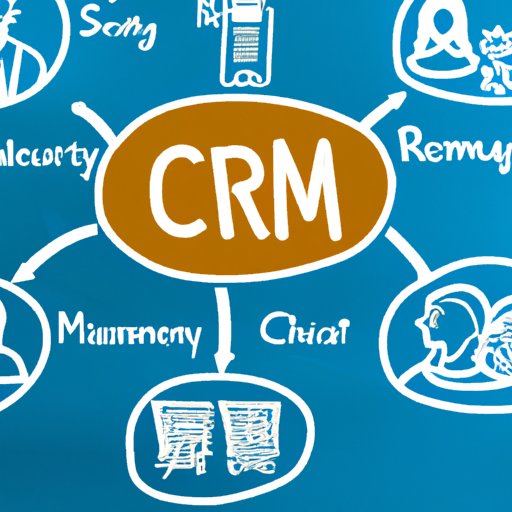Introduction
Customer relationship management (CRM) is a system used by businesses to manage customer relationships and interactions. In recent years, CRM has become increasingly important in supply chain management due to its ability to improve customer service, increase efficiency, and enhance visibility into the supply chain. This article will explore the basics of CRM in supply chain management and the benefits of implementing a CRM system. Additionally, strategies for leveraging technology for optimal CRM in supply chain management, understanding customer needs, and optimizing your supply chain through CRM strategies will be discussed.

Exploring the Basics of CRM in Supply Chain Management
CRM is a system designed to help businesses better understand their customers and create stronger relationships with them. The purpose of CRM is to provide companies with the necessary tools to manage customer data, track customer interactions, and identify opportunities to improve customer service. It also helps to ensure that customer needs are being met on a consistent basis and that customer satisfaction is being maintained.
There are several types of customer relationship management systems available, including on-premise, cloud-based, and mobile-based systems. On-premise systems are typically installed locally on a company’s servers and require more resources to maintain, while cloud-based systems are hosted in the cloud and can be accessed from any device with an internet connection. Mobile-based systems are specifically designed for use on mobile devices, such as smartphones and tablets.
The benefits of using a CRM system are numerous. For starters, it allows businesses to better understand their customers’ needs and preferences. This can lead to improved customer service and satisfaction, as well as increased efficiency and cost savings. Additionally, a CRM system provides enhanced visibility into the supply chain, allowing businesses to gain insight into customer trends, identify potential opportunities, and make better decisions.

The Benefits of Implementing a CRM in Supply Chain Management
One of the primary benefits of implementing a CRM in supply chain management is improved customer service and satisfaction. By tracking customer interactions and gathering customer data, businesses can better understand customer needs and preferences. This enables them to provide more tailored customer service, leading to increased customer satisfaction.
CRM also offers increased efficiency and cost savings. By automating processes and integrating systems, businesses can reduce manual labor and eliminate costly errors. Additionally, CRM can help to streamline processes and enhance communication within the supply chain, resulting in improved performance metrics.
How to Leverage Technology for Optimal CRM in Supply Chain Management
In order to maximize the benefits of implementing a CRM in supply chain management, businesses must leverage technology. Utilizing cloud-based systems can provide businesses with access to customer data anytime, anywhere. Automating processes can reduce manual labor and eliminate costly errors. Additionally, integrating systems can help to streamline processes and enhance communication within the supply chain.

Understanding Customer Needs with CRM in Supply Chain Management
In order to effectively meet customer needs, businesses must understand their customers. Analyzing customer data can help businesses uncover customer trends and identify potential opportunities. Additionally, businesses can use CRM to respond to customer needs quickly and efficiently.
Optimizing Your Supply Chain Through CRM Strategies
Businesses can optimize their supply chain through the use of CRM strategies. Streamlining processes can help to reduce costs and improve efficiency. Enhancing communication can help to ensure that customer needs are being met. Finally, improving performance metrics can help businesses gain insights into customer trends and make better decisions.
Conclusion
CRM is an essential tool for businesses looking to improve their supply chain management. By leveraging technology and understanding customer needs, businesses can optimize their supply chain through the use of CRM strategies. Improved customer service and satisfaction, increased efficiency and cost savings, and enhanced visibility into the supply chain are all benefits of implementing a CRM system in supply chain management.
To summarize, this article has explored the basics of CRM in supply chain management and the benefits of implementing a CRM system. Additionally, strategies for leveraging technology for optimal CRM in supply chain management, understanding customer needs, and optimizing your supply chain through CRM strategies were discussed. For further reading on the topic, we recommend exploring the resources provided by the Supply Chain Management Association.
If you’re looking to improve your supply chain management, implementing a CRM system is a great place to start. With the right strategies and technologies in place, you can optimize your supply chain and improve customer satisfaction.
(Note: Is this article not meeting your expectations? Do you have knowledge or insights to share? Unlock new opportunities and expand your reach by joining our authors team. Click Registration to join us and share your expertise with our readers.)
